Community marches to remember Clara Luper and the OKC sit-in movement's 65th anniversary
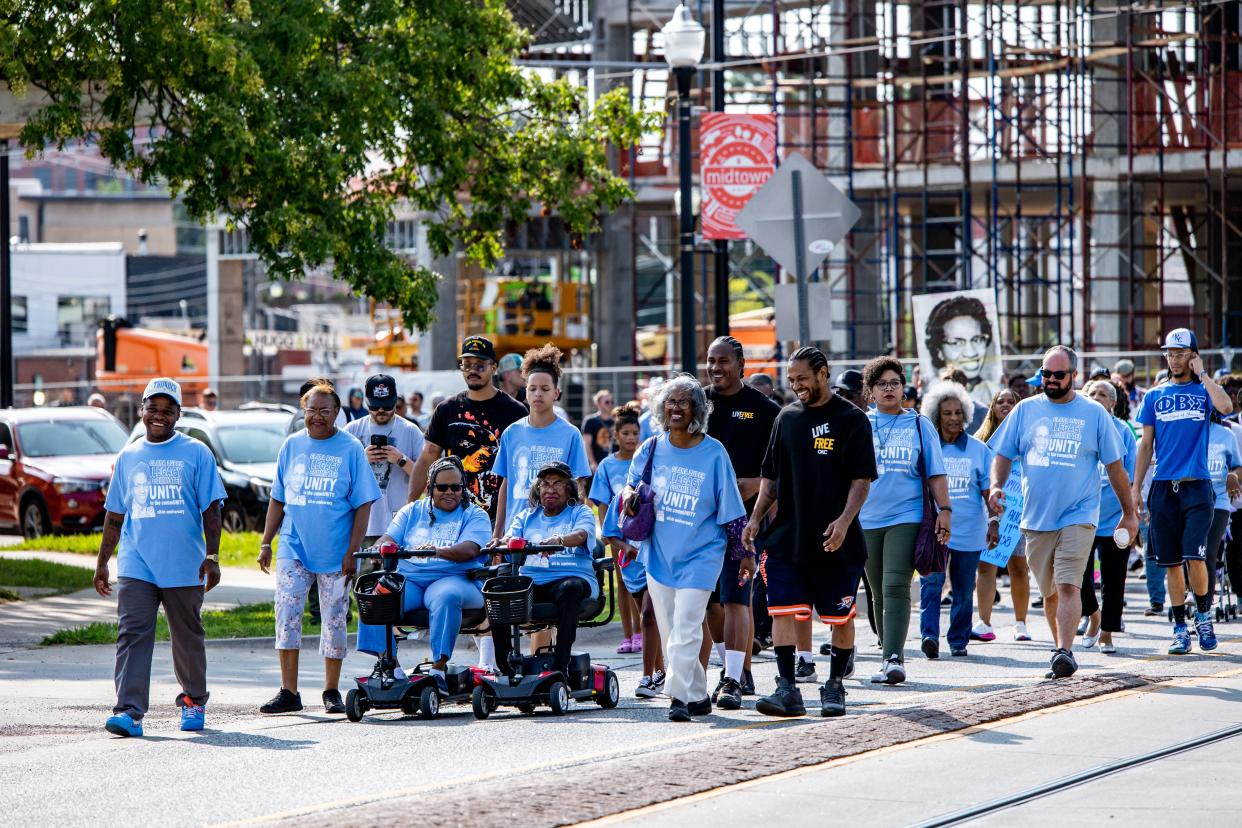
- Oops!Something went wrong.Please try again later.
There were jokes about having to get up so early on the weekend as dozens gathered to celebrate the 65th anniversary of the Oklahoma City sit-in movement led by local civil rights pioneer Clara Luper.
But the group was reminded that the children involved in the original movement gave up their Saturday mornings, too.
"Today symbolizes the hopes and dreams of the hundreds of young people that gave their Saturday mornings, every single morning," said Marilyn Luper Hildreth, Luper's daughter and one of the original 13 sit-in participants. "Instead of looking at cartoons, we were out on the streets of Oklahoma City."
More: 65 years after OKC's sit-in, Clara Luper's 'radical love' still reverberates today
Luper and 13 of her students staged their first sit-in protest against segregation at Katz Drug Store on Aug. 19, 1958, where they asked for cokes. They returned to Katz day after day, until the restaurant declared it would no longer hold to segregation. This launched a six-year movement in Oklahoma City that successfully desegregated many restaurants and businesses.
Saturday's crowd gathered at Frontline Church, 1104 N Robinson, to hear from Hildreth, fellow sit-in participant Joyce Henderson and Clara Luper Legacy Committee member Jabee Williams.
Living History: 65 years after Clara Luper led OKC's sit-in, participants carry the torch
Hearkening back to the ritual that would take place before each sit-in, Henderson led the group through civil rights anthems like "Ain't Gonna Let Nobody Turn Me 'Round," "Woke Up This Morning (With My Mind Stayed On Freedom)," and "We Shall Overcome."
Afterward, the original sit-in participants led a march to Kaiser's Grateful Bean Cafe at 1039 N Walker, where a group of children sat at the counter to represent the children who did so 65 years ago at Katz Drug Store.
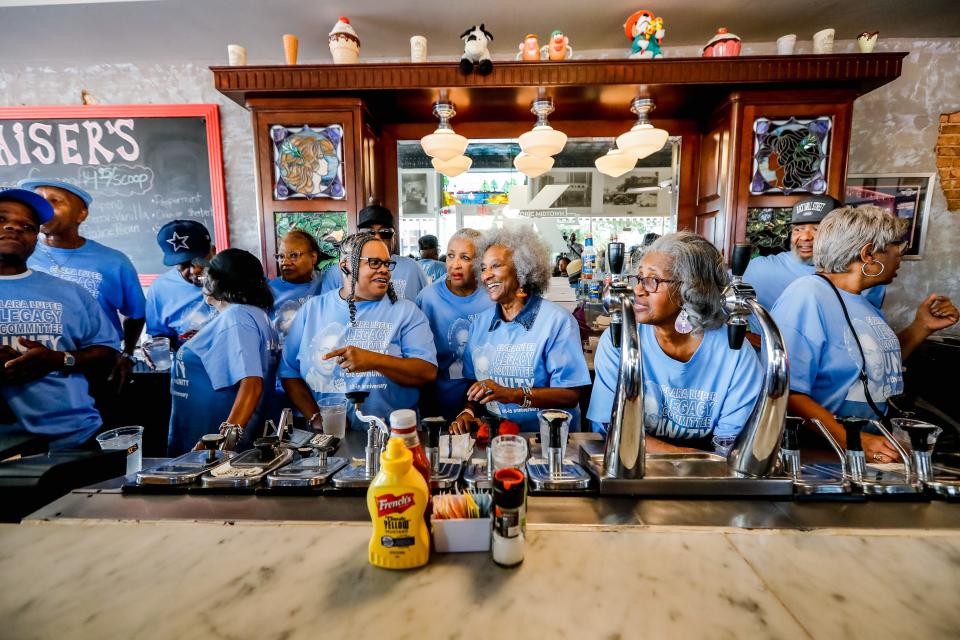
OKC mayor: 'It's OK to study your history' and 'it's okay to feel bad about it'
Before the march to Kaiser's, Hildreth called Oklahoma City Mayor David Holt on the stage at Frontline Church, calling him her "favorite mayor," and "my governor," to which the crowd erupted in laughter and applause.
Holt reflected on how the story of Luper and the Oklahoma City civil rights movement has been told more broadly across the city over the last five years, and how it's important for people to learn from past generations' mistakes.
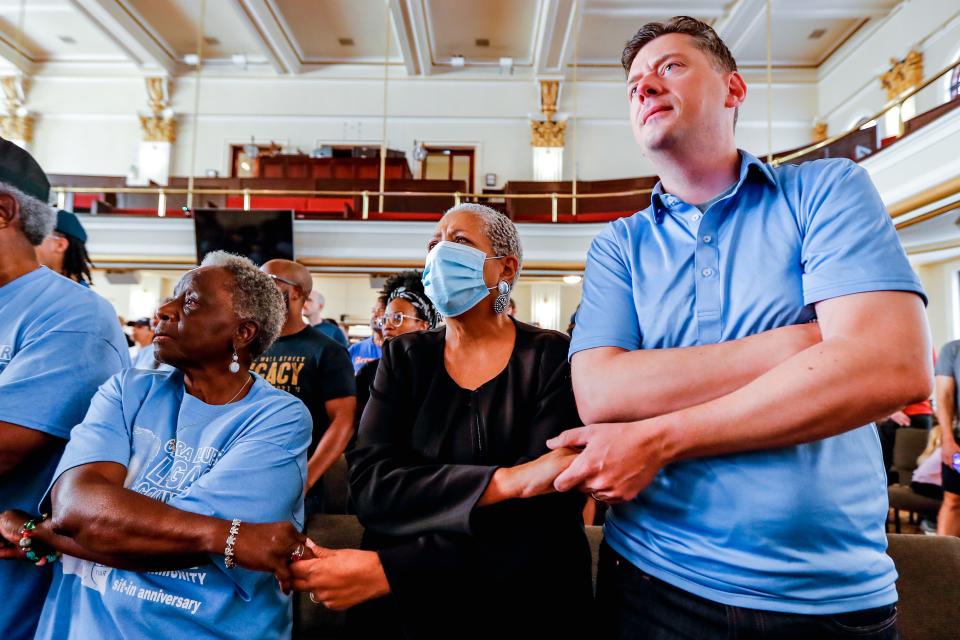
In a time where Oklahoma schools are limited by law on what they can teach regarding race and gender, Holt took a stand for Oklahoma City's desire to teach its true civil rights history, no matter how painful.
"It's OK to study your history," Holt said, evoking more applause and cheers. "And it's OK to feel bad about it. Not in a guilty way. I wasn't alive in 1958. And it's OK for me to say, 'What am I doing today to make sure that never happens again?' That's what we do in Oklahoma City, no matter what anybody else tells us to do."
The story of the Oklahoma City sit-in movement
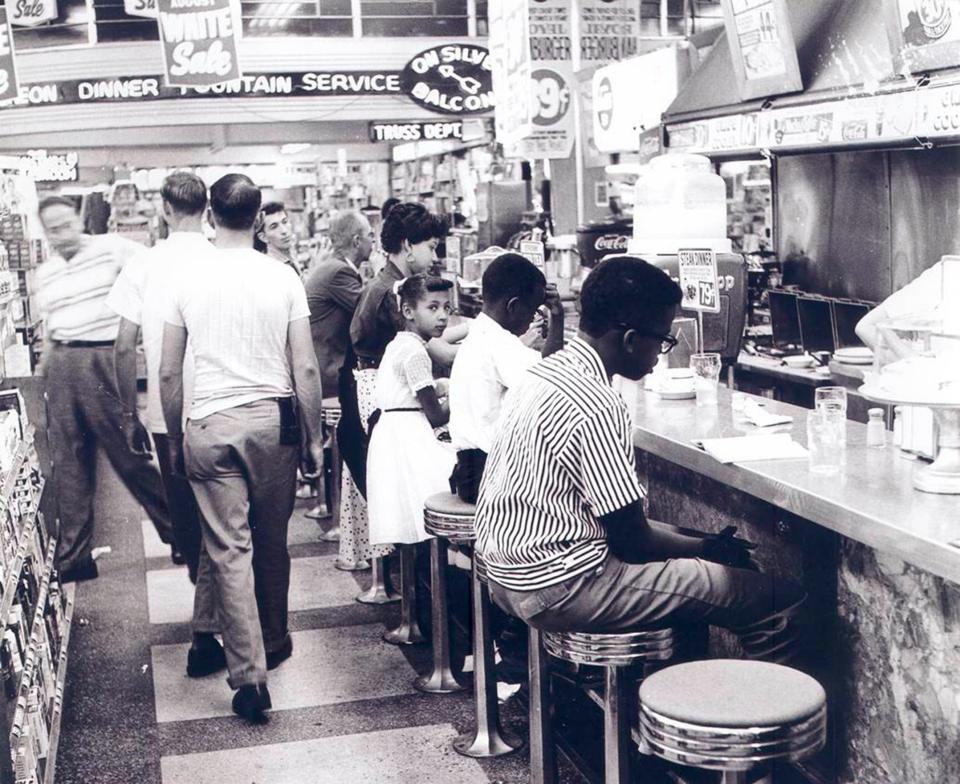
Luper helped organize the NAACP Youth Council in the 1950s and was its active adviser for 50 years. She participated in several marches with the Rev. Dr. Martin Luther King Jr., and her shared advocacy for nonviolent resistance to segregation was considered key to the success of the OKC sit-ins.
In 1958, Luper had recently returned from a trip across the country where a group of her students performed her play "Brother President" about King in New York City.
On the way to New York, the travelers took a northern route where they experienced eating in desegregated restaurants for the first time. Back home, they were only allowed to eat from restaurants take-out style.
"For the first time in our lives, we had the opportunity to go into a restaurant, sit down and eat like normal people, and not out of a brown paper sack," Hildreth told The Oklahoman in 2021. "When we got back to Oklahoma City, we decided enough is enough."
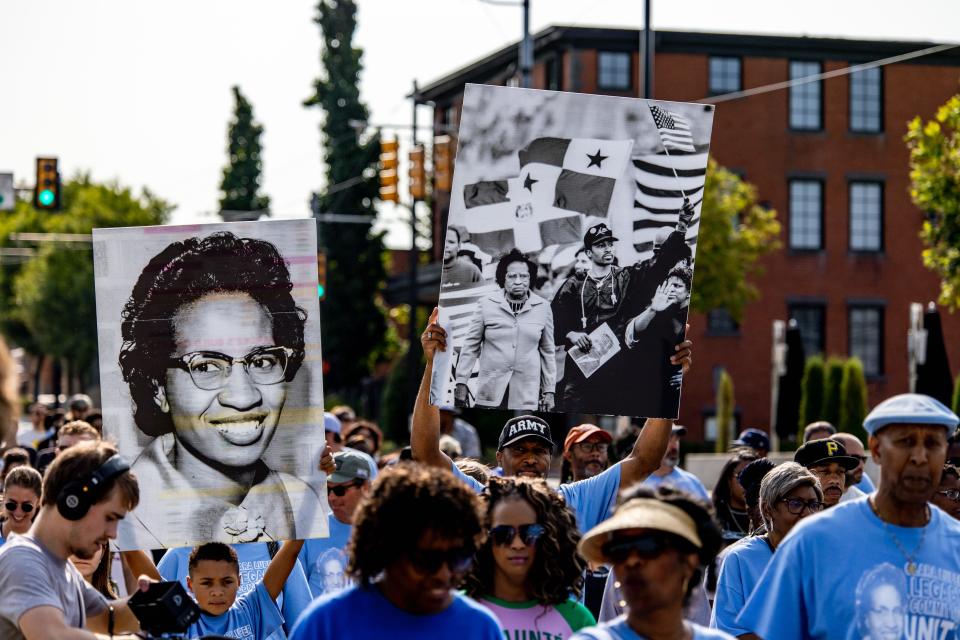
Luper and her students gathered at Calvary Baptist Church before the first sit-in on Aug. 19, 1958, and for many days after that. She would use the time to teach the students about the practice of nonviolent protesting and would sing songs to help them endure whatever insults and physical abuse would come their way.
"If somebody pushed you at the back of your head or somebody tried to push you over, if somebody poured something on you, (we were told) to turn the other cheek," sit-in participant Joyce Jackson told The Oklahoman in 2021.
As the 60th anniversary of the March on Washington approaches — having taken place Aug. 28, 1963 — sit-in participant Joyce Henderson recalled attending the march with Luper and others when she was 16.
"When she said we were going to the March on Washington, I'm thinking, 'We're going to march on Washington,'" Henderson said. "To find out once we got there, the thousands of people who marched on Washington ... I discovered not only did we have issues in Oklahoma City and Oklahoma, but the whole United States wanted equality for everybody. Not just for one race of people, but for everybody regardless of race, creed or color."
Granddaughter of sit-in participant draws strength from the stories
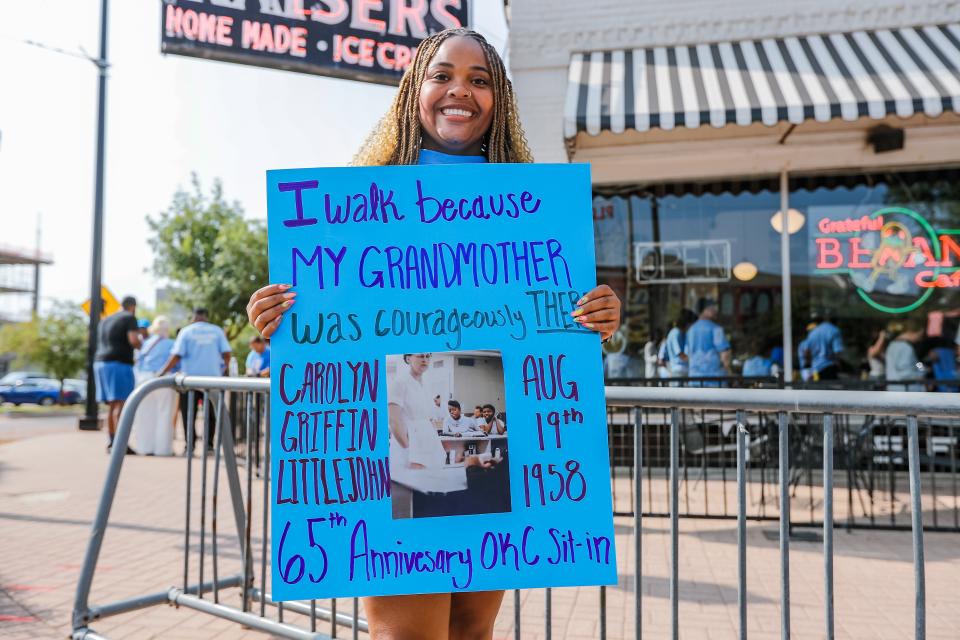
Danielle Pullen proudly carried her neon blue poster in Saturday's march with the words "I walk because my grandmother was courageously there."
Pullen's grandmother, Carolyn Griffin Littlejohn, joined the movement in the days following the first Katz Drug Store sit-in.
Although she has grown up without segregation, thanks to brave people like her grandmother, there have been times throughout her life where Pullen has felt alone and had to speak up for herself.
It's in those times she is able to draw strength and inspiration from what her grandmother and so many others did.
"Whether it was based on the color of my skin or my gender, or whatever my intersectional identity was, it really gave me a strength to always stand up for what was right and always get into good trouble," Pullen said. "Like never be too afraid to, not disrespect authority, but stand up to authority if I knew something was wrong."
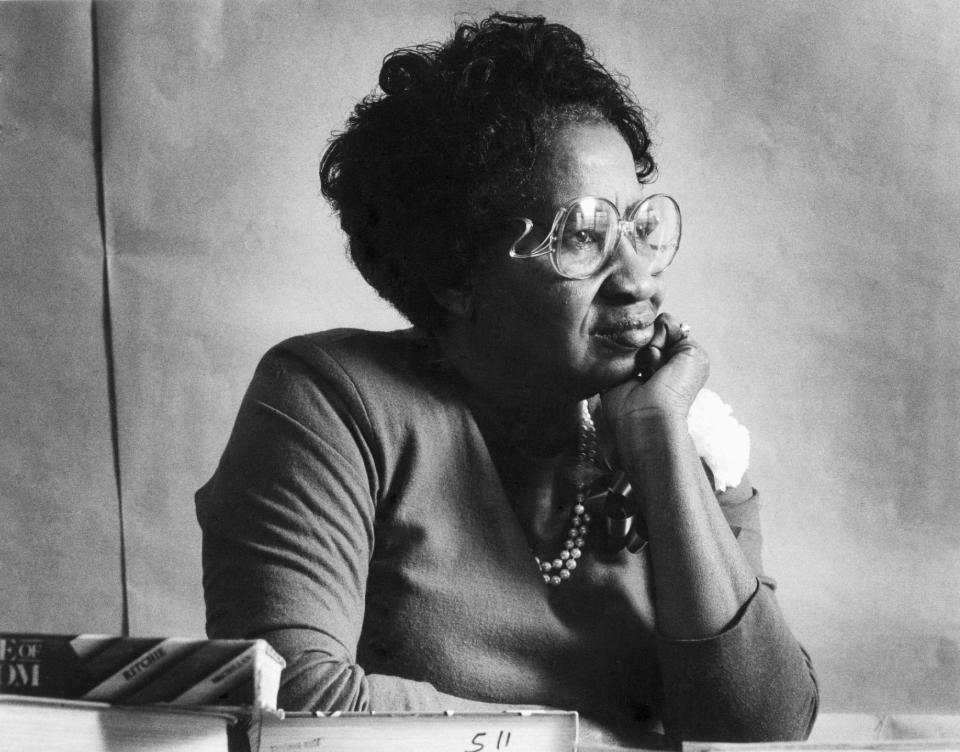
Pullen recently became the director of the Office of Diversity, Equity and Inclusion at Oklahoma City University, where Luper was awarded an honorary doctorate in 2006 and where underrepresented students are given full scholarships in her name.
She said she's proud to work at a school that so visibly honors Luper's legacy, and hopes to be a voice for others to learn about her.
"It's really been really great to see that her memory is living on ... I just want to keep on doing that," Pullen said.
College students hoping to carry on Luper's legacy
Two students Pullen has come to know through Oklahoma City University were present for the reenactment, including Clara Luper Scholar and 2023 graduate BreAuna Shaw.
Shaw, 22, said she owed the scholarship credit for allowing her to graduate in four years debt-free and look forward to attending law school, as well as forever connecting her with Luper's story and family.
"More people are learning about her and her legacy," Shaw said. "And I'm just happy that I can always be connected to it. Clara Luper cared so much about education, and because of her I was able to accomplish these goals."
The Clara Luper Scholarship aims to provide a private education to "deserving students from diverse backgrounds who demonstrate financial need," according to OCU's website.
Kel Pinkston, 20, is an American Indian Scholar at OCU and was also at Saturday's march and reenactment.
Pinkston said he recently reinstated the university's NAACP chapter and hopes to connect minority students with advocacy initiatives throughout the city.
Being at Saturday's event was a reminder that the history being celebrated was "not so long ago," Pinkston said.
"When you still have people living, historical figures in my eyes, living, able to tell the stories accurately, it speaks volumes," Pinkston said. "And when they encourage you to take on the torch that they've passed, and walk the path that they've paved, it tells you that there's still more work that needs to be done."
This article originally appeared on Oklahoman: OKC remembers Clara Luper through sit-in reenactment 65 years later

